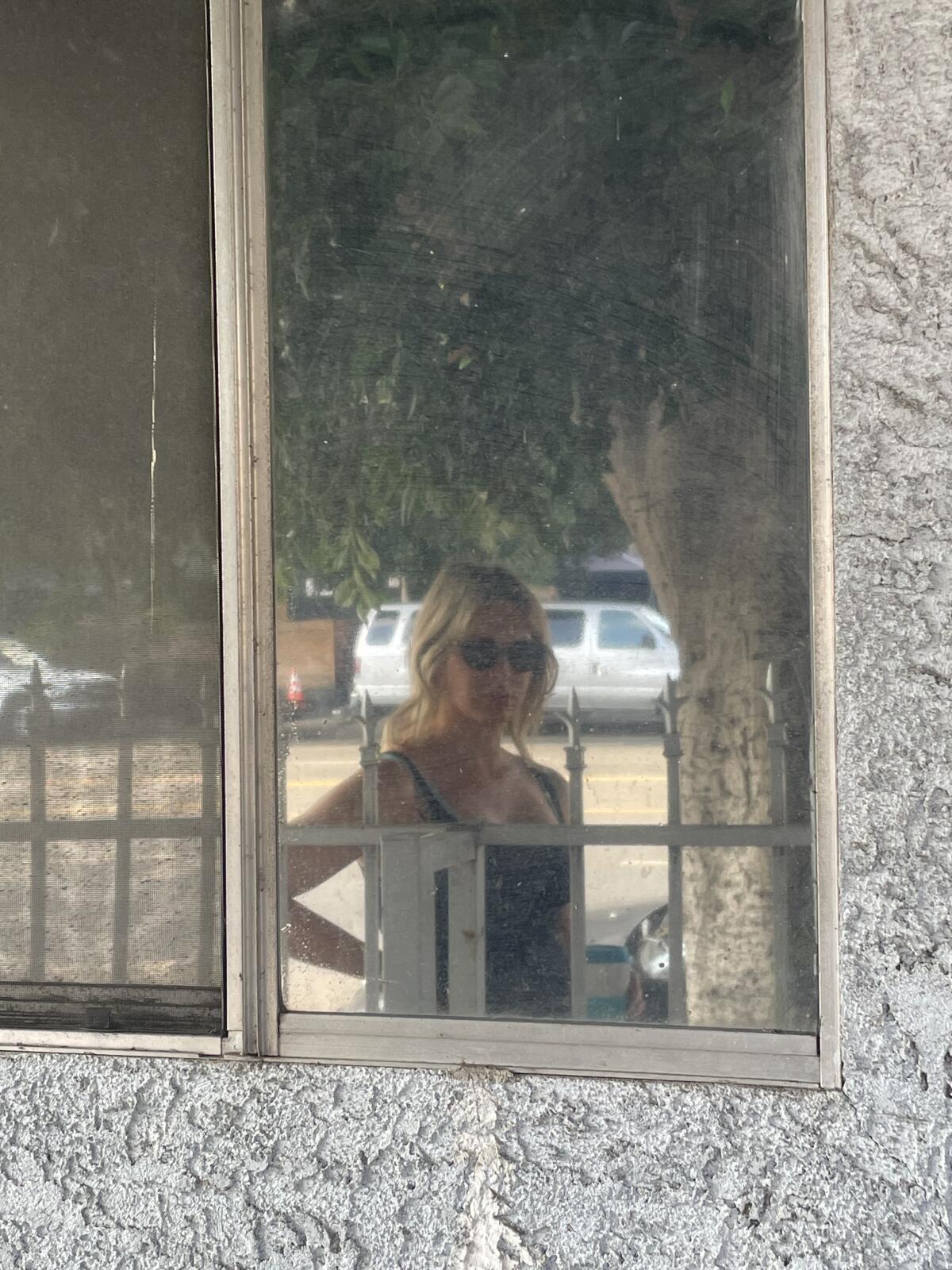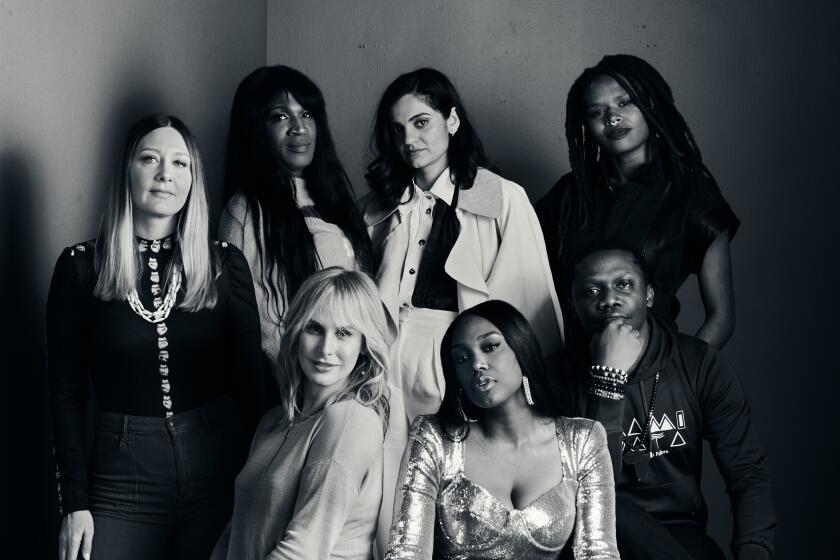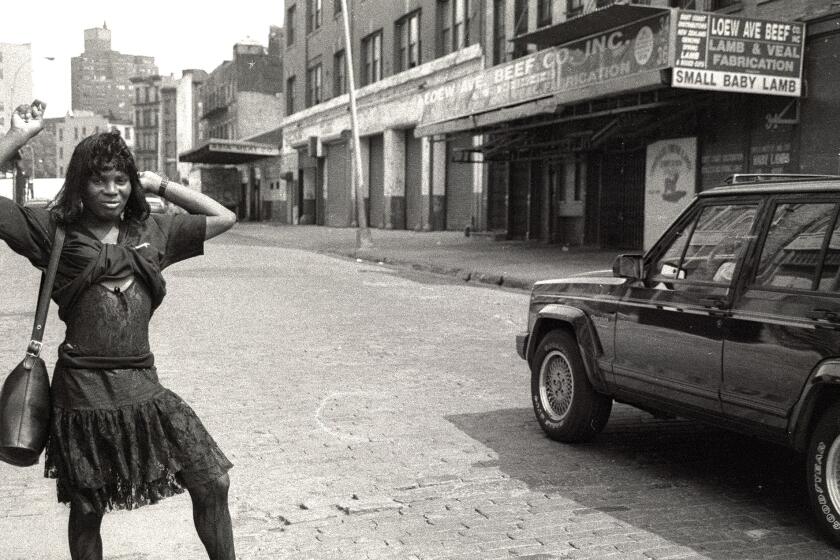‘Sweat out the toxins’: How filmmaker Zackary Drucker stays positive in a bleak time

- Share via
As part of our yearlong series on Sundance filmmakers, The Independents, we asked participants to keep a diary of one day in their working life and submit an accompanying self-portrait. Today’s diary is from Zackary Drucker (“The Stroll”), who hits the gym, catches up with friends and eats by candlelight to find moments of “joy” in a bleak time.
Read yesterday’s diary: ‘Pitching is performing’: How filmmaker Thembi Banks goes after a new gig
I wake up too soon, mid-dream: I’ve just arrived in Israel to attend a film festival. Joe Biden is teasing George Clooney that his giant estate on the Mediterranean Sea isn’t big enough to host the opening reception. I am there in the estate, alone in a majestic bathroom with travel toiletries on the counter belonging to a woman who is visiting, but not present, in the house. She doesn’t have anything fancy, only standard travel-size shampoo and perfume. I look out and see many levels of the fractured sea and a hiking path to the shore. There are flags from around the world, many flying on the same pole — Japan, Korea, Brazil. The Olympics of film festivals in my mind. A geography of devastation and glamour inside my diasporic body.
My partner makes us coffee, and I try to wake up as quickly as possible to talk to a development executive in London about a project they have me in mind for. Calls to London always happen first thing in the morning. I look at emails that came in overnight, quietly resenting them.
Call to London is fab! Very enticing project with mass appeal, the kind of film that could actually get made in this tenuous market. But I won’t get my hopes up.
I send a few emails that I composed last night. I go outside in my pajamas like a sleepwalker to retrieve my L.A. Times paper, which arrives daily, lying in the driveway when I wake up. I listen to NPR simultaneously. The suffering of Palestinians in Gaza is in the airwaves, in print and in hearts all over the world. Every day is harder than the last, a Gazan woman reports through a tin can transmitter.
To commemorate next year’s 40th edition of the Sundance Film Festival, we’re spending 12 months looking at the lives of 7 members of this year’s class.
I listen to Imara Jones’ “TransLash Podcast” where trans historians Susan Stryker and C. Riley Snorton map out our community’s long history of resilience. I’m grateful to be talking to Imara later today about a project that she’s working on. Imara’s investigative journalism on the anti-trans hate machine, a term she coined and the name of her award-winning podcast, is a stand-alone exemplar of interrogating the roots of this particular assault on human rights.
I walk to the gym so I can pump iron and sweat out the toxins of modern life. One of my closest trans sisters, Sabel, meets me at the gym, a fairly frequent ritual we enjoy. We catch up and laugh between sets. Going to the gym is often a lone experience, so to be able to enjoy fellowship and relish the warmth of sisterhood is an island of joy in an otherwise mundane routine.
While Hollywood is slowly waking up from the strike, it feels like shards of brokenness coming back together to form a shattered mosaic of what was.
I meet on Zoom with my longtime producer Madison Passarelli, our editor, assistant editor, and archival producer. We’re working on a new feature documentary, and as we are in the first weeks of the edit, we are looking at the proverbial mountain we must collectively climb. We are working on the story structure and in the nascent phase of construction. At this point, we’re pouring the concrete for the basement.
I agree to record scratch audio to bring one of our narrator’s voices to life, which I then do on my iPhone in the insulated quiet of my closet. Although our internal team, and eventually the studio executives, are the only ones who will ever hear this rough draft audio, I still put all my focus on flexing my acting muscles and giving my performance panache, while not forgetting to enunciate. I record two takes of every segment for safety.
‘The Stroll,’ premiering Wednesday on HBO and Max, is part of a wave of recent films to reconstruct LGBTQ+ stories from unexpected sources.
I have a call with my agents at CAA and Imara Jones about the current market for feature docs. It’s bleak. Imara and I talk afterward, and it’s a bright spot in my day. She has become a professional friend, but I am also a mega fan of hers.
I check in with my assistant Milano. We have a daily meeting toward the end of the day that includes scheduling, accounting questions, coordinating travel on an upcoming trip to New York City, corresponding with a range of people both in the art world and entertainment world, and reviewing documents and deadlines. She works remotely and I couldn’t take on the volume of work I do without her support.
I make personal calls at the end of the day. I talk to my aunt and my parents and get more breaking news updates from them. I have an engaged and deep conversation with my man about various topics. I help him cook dinner and we eat with a single candle lit. I clean the kitchen while he takes a bath and reads an article to me while still in the tub.
We recite the Mourner’s Kaddish for the lives lost in Israel and Gaza, and read the Tanakh (Psalms) on our way to bed.
More to Read
Only good movies
Get the Indie Focus newsletter, Mark Olsen's weekly guide to the world of cinema.
You may occasionally receive promotional content from the Los Angeles Times.












